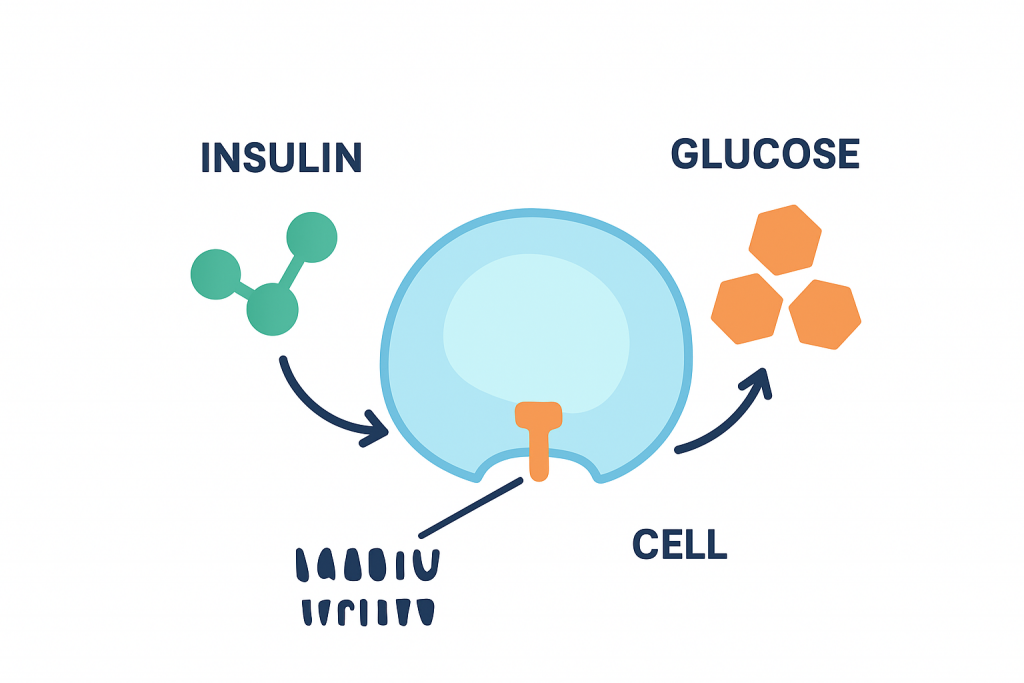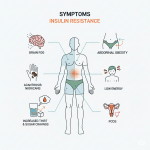
Insulin resistance is increasingly recognized as a quiet driver behind multiple chronic diseases affecting millions in the UK and worldwide. However, beneath the surface, new research challenges traditional views offering hope and sparking debate about the best ways to manage this common metabolic disorder.
To support your metabolic health through daily habits, check out my Everyday Mastery guide to habit formation.
The Growing UK Insulin Crisis by the Numbers
In 2025, around 30–40% of UK adults may have some degree of metabolic dysfunction. This condition is a precursor to type 2 diabetes, heart disease, and certain cancers. While UK-specific data is limited, recent US studies show 40% of adults aged 18–44 are insulin-resistant¹, suggesting similar trends in Western countries.
This silent epidemic burdens healthcare systems. For example, GP-recorded type 2 diabetes prevalence in England reached 7% for adults aged 17 and over in March 2024², representing only the diagnosed cases.
What Is Insulin Resistance?
Traditionally, insulin resistance occurs when the body’s cells respond less effectively to insulin. The pancreas compensates by producing more.
However, new research suggests a more complex picture. The “Energy Model” proposes that dietary changes, especially the rise of refined seed oils, can trigger oxidative stress and mitochondrial damage, causing insulin resistance from within cells³. This challenges older views that only saturated fat or excess carbohydrates are responsible.
Controversies: What Causes Insulin Resistance
The Fat Debate
For decades, saturated fat was blamed. Today, evidence shows a more nuanced picture:
- Polyunsaturated seed oils: The Energy Model suggests that refined, bleached, deodorized (RBD) seed oils may promote oxidative stress, forcing cells to adapt³.
- Processing matters: Animal studies indicate that heated seed oils can damage the liver, worsen lipid profiles, and increase oxidative stress markers⁴.
- Moderation counts: Some research shows that moderate intake of unsaturated fats may improve insulin sensitivity⁵. Quality and processing seem more important than the oils themselves.
Diet Approaches: No Clear Winner
There’s no one-size-fits-all solution:
- Low-carb/Keto advocates promote ketogenic diets and intermittent fasting.
- Balanced diet supporters focus on whole foods regardless of macronutrient ratios.
- Research indicates higher intake of polyunsaturated and monounsaturated fats can benefit insulin sensitivity, while higher saturated fats and trans fats may negatively impact glucose metabolism⁶.
Adaptive Perspective
Some experts suggest resistance may initially be protective, preventing cellular damage. Over time, chronic activation can become harmful. This highlights why simple “fix it” approaches often fail.
Experts to Follow
- Dr. Jason Fung: Promotes intermittent fasting and ketogenic strategies to reverse insulin resistance.
- Dr. Ben Bikman: Explains insulin resistance as a root cause of many modern diseases and advocates metabolic interventions.
- Glucose Goddess: Offers practical tips blending science and lifestyle habits for blood sugar balance.
What You Can Do No
Regardless of theory, research supports several lifestyle strategies:
- Eat whole, unprocessed foods high in fiber and healthy fats.
- Move regularly—even short bursts of activity help.
- Reduce stress and sleep well.
- Consider intermittent fasting or reduced sugar intake if suitable.
- Use minimally processed oils and avoid repeatedly heated oils.
- Monitor your health with your provider for early detection.
For practical habit-based strategies to support metabolic health, explore Everyday Mastery.
Final Thoughts
Insulin resistance is a complex, multifaceted epidemic. Debates around seed oils and diet illustrate the complexity of metabolic health. Staying informed and following trusted experts empowers you to make lasting changes, even as research evolves.
References
National Health and Nutrition Examination Survey (NHANES) 2021
A 2021 analysis of NHANES data found that 40% of U.S. adults aged 18 to 44 are insulin resistant.
Source: PubMed
National Diabetes Audit (NDA) 2023–24, NHS Digital
The National Diabetes Audit provides data on GP-recorded type 2 diabetes prevalence in England.
Source: NHS Digital
The Energy Model of Insulin Resistance: A Unifying Theory
This article discusses the “Energy Model” theory linking seed oils to metabolic disease and cancer.
Source: Frontiers in Nutrition
The 2024 Levels Guide to Seed Oils and Metabolic Health
This guide explores the effects of seed oils on metabolic health, including oxidative stress and mitochondrial damage.
Source: Levels
Timing of Unsaturated Fat Intake Improves Insulin Sensitivity
This study suggests that the timing of unsaturated fat intake can improve insulin sensitivity through the gut microbiome and bile acid metabolism.
Source: Nature Communications
Comparison of the Effects of Monounsaturated Fatty Acids and Saturated Fatty Acids
This study compares the protective effects of various unsaturated fatty acids on pancreatic islets under the stress of saturated fatty acid-induced metabolic disorder and lipotoxicity.
Source: PubMed
Insulin Resistance and Cardiometabolic Risk Profile Among Non-Diabetic American Young Adults
This research investigates insulin resistance and cardiometabolic risk factors among non-diabetic young adults in the U.S.
Source: ResearchGate

